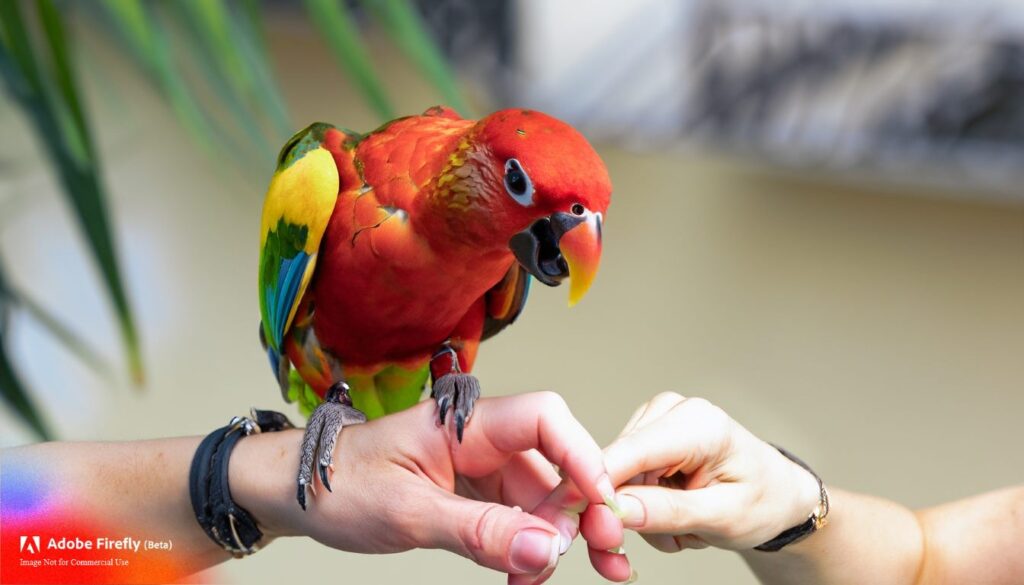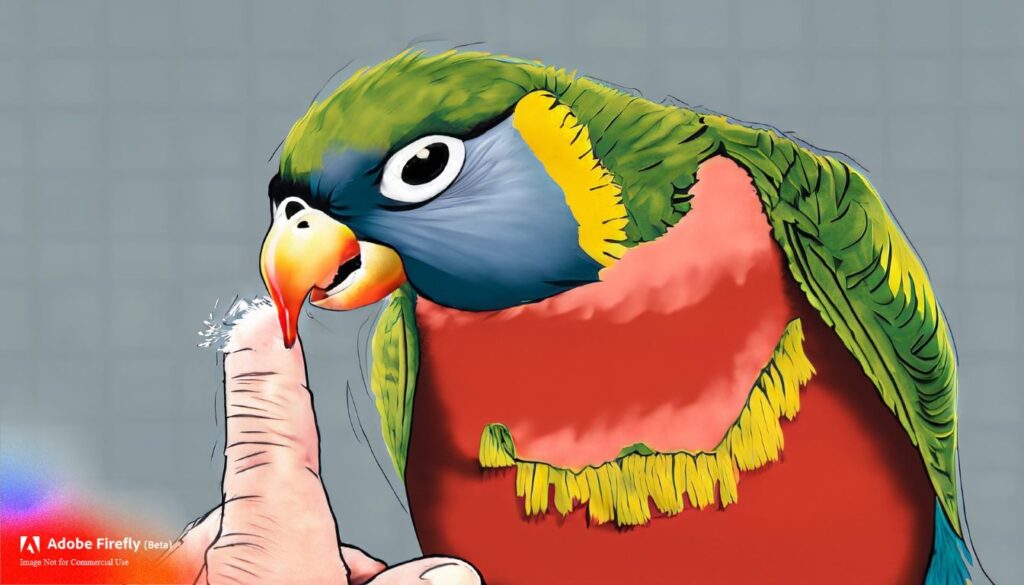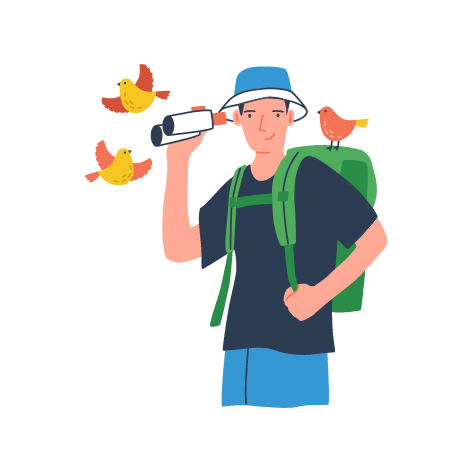
Have you ever been a victim of a parrot’s bite? Or are you afraid of being bitten by your parrot?
Parrots are exciting creatures and a perfect addition as house pets. These birds are popular across the world, and having them is surely a thrilling adventure. However, lately, a lot of new bird enthusiasts are asking if a parrot can potentially bite off a finger. Join us as we find out the same.
The beautiful parrots known for their vivid plumage and uncanny ability to mimic speech are loved by all. These birds possess beaks that are nothing short of extraordinary. If explained in short, Parrots’ beak is truly the one with strength and surprisingly strong. But whether a parrot’s bite can chop off your finger is still a question.
Here, we take a closer look at the inner workings of a parrot’s beak. Whether you’re a passionate bird enthusiast or simply curious about these colorful creatures, come along with us on this journey.

How Strong Is a Parrot’s Bite? Could It Bite Your Finger Off?
Unlike it may appear, a parrot’s bite is truly strong. However, it is unlikely for a parrot to bite off your finger. Parrots have a sharp and hooked beak that helps them crack open seeds and nuts. Their beak also helps in defending territory and for other surprising purposes.
The strength of a parrot’s beak/ bite depends upon a range of different factors, including:
- Species of Parrot: Some larger species of parrots, including Cockatoos and Macaws, have a really powerful bite.
- Individual Parrot: Every parrot has its own personality, and some of them can be more aggressive or prone to biting than others.
- Circumstances: How strong a parrot’s bite can be depends upon circumstances as well. In a situation when the bird feels scared or threatened, it may bite harder.
While discussing how harsh can be a parrot’s bite, the bad news is that it can be very painful. Parrots have a surprisingly strong bite force than many other birds.
The bite of any animal/ bird is typically measured in PSI “Per Square Inch.” A human’s bite can have a force of around 162 PSI (150 to 200 PSI typically), and it is noted as modest. On the other hand, a parrot’s bite can have a force of around 300 to 700 PSI.
Typically, a dog’s bite force is estimated to be around 230 to 250 PSI, so parrots clearly have a stronger bite. Hence, in the list of top bites, parrots may not be the top, but they can surprisingly leave many animals, birds, and even us humans behind. However, due to their beak size, it is unlikely for them to bite our finger off (but it isn’t completely impossible).

Why Is My Parrot Biting Me All Of A Sudden?
Parrots can start biting you all of a sudden due to the following reasons:
- Due to stress, fear, or when they feel threatened. It happens especially when parrots sense other pets around, hear loud noises, or experience any such situation.
- Parrots may suddenly start biting you if you experience illness or injury. This sudden behavior change can be a result of pain and discomfort.
- Parrots, like any other birds, have territorial behavior, and when you invade their space, they will bite to defend.
- Female parrots start biting during breeding season since hormonal changes affect their behavior.
- Insufficient socialization during the early stages of a parrot’s life can make them aggressive. This can also lead them to become uncomfortable around humans and thus develop a habit of biting.
- Some parrots show biting behavior due to their attention-seeking nature.
How To Stop Parrot From Biting?
Stopping a parrot from biting requires patience, understanding, and consistent training.
Here’s how you can do the same:
- If your parrot has a habit of biting often and unnecessarily, pay attention to what’s triggering this behavior. Understanding the cause can help you address the behavior more effectively.
- When a parrot interacts with you without biting, praise them, reward them, and show affection. Such acts of positive reinforcement will encourage them to separate themselves from any negative behavior.
- Avoid negative reactions when your parrot bites.
- When touching your parrot, desensitize gradually. Begin by touching them very gently on non-sensitive areas like the back and feet. Gradually move towards their head and beaks.
- Always watch your parrot for any signs of discomfort while patting, and stop when the bird is stressed out.
- Train your pet parrot with basic commands like “No,” Step Down,” etc. Such commands can help you manage their behavior.
- Socialize your parrot and build trust and familiarity. Doing so reduces their fear-based biting behavior.
- Ensure enough mental stimulation for your parrot through puzzles and toys. Doing so helps in releasing their frustration, which otherwise may come out through biting.
- Be consistent in training and ensure that all family members or caregivers follow the same rules.
- Use protective gloves while handling your parrot, especially if the bird has a history of biting.
- At last, if nothing works and your parrot’s biting behavior persists or worsens, consult a bird behaviorist or bird trainer for guidance.
It is important to learn that controlling and breaking the habit of biting among parrots may take time. Especially when the behavior is well established, it takes time to undo the same. Therefore, continue your positive efforts while being patient.
What Should You Do If You’ve Been Bitten By a Parrot?
If bitten by a parrot, here’s what you should immediately do:
- Start by rinsing off the wound under cold tap water. Further, wash it with a gentle antiseptic liquid/ solution thoroughly to remove any bacteria.
- Now, apply hydrogen peroxide, an over-the-counter antiseptic ointment, or any suitable antiseptic solution to the cut. Doing so is important to reduce any risk of infection.
- For bleeding wounds, apply gentle pressure with a clean cloth or sterile gauze. You should also try to elevate the injured area since it will help reduce bleeding.
- Once the bleeding has stopped, use a dressing or sterile bandage to cover the wound and also to keep it clean and protected.
- Make sure you monitor the wound for any signs of infection. Monitor signs of redness, swelling, warmth, pus, or worsening pain, and upon noticing any, seek medical attention promptly.
- A parrot’s bite can be deep and may puncture the skin; thus, in any such case, consult a healthcare professional. Also, reach a doctor if the wound shows signs of infection. The doctor may prescribe antibiotics or recommend a tetanus shot, depending on the severity of the bite.
Wrapping up…
Overall, a parrot’ bite isn’t likely to chop off your finger, but it can be painful and carry a risk of infection. Therefore, at first, whenever approaching your parrot, be extra cautious. Secondly, if you have already got a wound, address it timely and rightfully to minimize any kind of pain, infection, and other risks.

Hi, There and Welcome to BirdsNews.com, is here to help you learn and care about pet birds. and this blog is a journal of everything I’ve learned.
